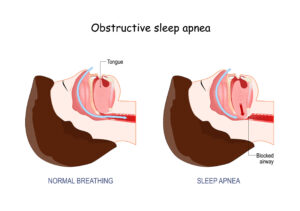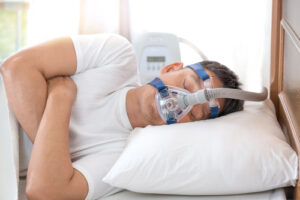Posted by: Maryland ENT in General
Are you worried that your snoring is more than an annoying habit your partner complains about when you wake up in the morning? Chronic snoring is more than disruptive to your partner; it could also be a tell-tale sign of sleep apnea.
If you snort, gasp, or even gag while snoring, you might have obstructive sleep apnea (OSA). OSA is the most common type of sleep apnea.
When you sleep, your tongue, mouth, face, and the rest of your body relax. As a result, your tongue can fall toward the back of the roof of your mouth, blocking the airways.
If your airways get blocked, this gets in the way of breathing. It also prevents you from getting adequate oxygen.
People with OSA stop breathing for about 10 to 20 seconds while sleeping. You may stop breathing a hundred times in one single night. Although snoring doesn’t occur in all cases of sleep apnea, and not everyone who snores has sleep apnea, OSA could be a possible cause if you snore.
How can you tell for sure? Keep reading to learn more!
Snoring

When you sleep, your throat tissues are more prone to relaxing. Because the size of your lungs doesn’t change, you still require the same amount of air, which is forced to squeeze through a narrower space.
As air moves past the relaxed tissues and vibrates, a sound is produced, which is what’s known as snoring. Chronic and loud snoring accompanied by the following symptoms could point to sleep apnea, including:
- Pauses where you stop breathing
- Uncharacteristic irritability or moodiness
- Waking up with a sore throat or dry mouth
- Daytime fatigue
- Drowsing off at unusual times, such as while watching TV, reading, or even driving
- Poor concentration
- Constantly waking up with a headache
- Insomnia
- Decreased productivity
- Always taking naps during the daytime
- Abruptly waking up at night choking or gasping for no apparent reason
You typically begin snoring heavily right after falling asleep if you have sleep apnea. The snoring usually becomes very loud but is interrupted for a while when you stop breathing.

When you stop breathing, a loud gasp or snort follows this as you try to breathe. The pattern recurs throughout the night as you try to sleep.
Snoring worsens when you sleep on your back. Falling asleep on your back causes the lower jaw to slip back, pushing the tongue in front of the breathing passage or airway.
Typically, the person next to you in bed is the one disturbed the most by your snoring. Many people who snore don’t even realize they snore until their partner brings it up. Since your partner is often the first to hear your loud snoring, snorting, and gasping, be sure to ask them, as you’ll probably have no memory of it.
Although it may seem like you’re sleeping peacefully, it’s likely the opposite if you’re snoring. The disruption of airflow due to OSA can be dangerous due to decreased airflow into your lungs, which lowers blood-oxygen levels.
The Dangers of Sleep Apnea
A good night’s sleep enables your body to recharge and stay healthy. Without enough sleep, as is the case with OSA, your health and overall well-being are at risk. Sleep apnea can make you more prone to:
- Jaw pain
- Depression
- Work-related accidents
- Diabetes, obesity, damage to the pancreas, high blood pressure, and liver problems
- Irregular heartbeat, heart failure, heart attack, and stroke
Risk Factors of Sleep Apnea
The factors below increase your chances of having sleep apnea:
- Being male
- Having large adenoids, tonsils, or a large tongue
- Being over the age of 40
- If you’re overweight
- A family history of sleep apnea
- Shorter lower jaw
- Having a large neck
- Sinus problems or allergies
Diagnosing Sleep Apnea
Your doctor will conduct a physical exam, carefully looking at your throat, mouth, and neck. You’ll be asked questions about your bedtime routine, daytime sleepiness, sleep quality, and any symptoms you might be experiencing.
If your doctor thinks you have sleep apnea, you may take a sleep study that records the activity of your body during sleep. Once an accurate diagnosis determines you have sleep apnea, they can then create a customized treatment plan. Your treatment plan will detail ways to help you breathe better while sleeping, along with how to get a better night’s sleep.
Treating Sleep Apnea
The main focus of treatment is keeping the obstructed airway open to allow free flow of oxygen, which is a big problem in sleep apnea. Treatment for sleep apnea may involve the following:
Mouthpieces
You may wear a mouthpiece to temporarily reposition your tongue and jaw so that air flows without obstruction. You can improve sleep apnea symptoms like snoring by moving the tongue and jaw into a new position so that air can flow without any obstacles.
CPAP

One of the most common forms of treating sleep apnea is with a CPAP (Continuous Positive Airway Pressure) machine. CPAP machines use a mask that’s put over your nose, and in some instances, your mouth to deliver continuous air while you sleep.
Myofunctional therapy
Muscle weakness within your upper throat, tongue, and mouth can cause snoring and sleep apnea. Strengthening exercises referred to as myofunctional therapy aid in improving muscle weakness in the airway and, in turn, sleep apnea.
Making Lifestyle Changes
In some cases, you can treat sleep apnea by making lifestyle changes while receiving other treatments. Eating healthy, quitting smoking, and being more active are all ways you can change your life for the better and improve your sleep apnea symptoms as well.
Coblation

If you suffer from chronic snoring, the sleep specialists at Maryland ENT may recommend Coblation. Coblation is a treatment that shrinks and removes excess tissue from inside the soft tissue using a radiofrequency device. The procedure takes as little as ten minutes to complete, with many patients seeing results in only 1-4 weeks.
Find Help for Chronic Snoring and Sleep Apnea
If chronic snoring has been keeping you and your partner up at night, Maryland ENT Center can help. Our sleep specialists specialize in treating snoring and sleep apnea.
Do you think you could have sleep apnea? Schedule an appointment at Maryland ENT Center in Baltimore, MD, to learn more!



